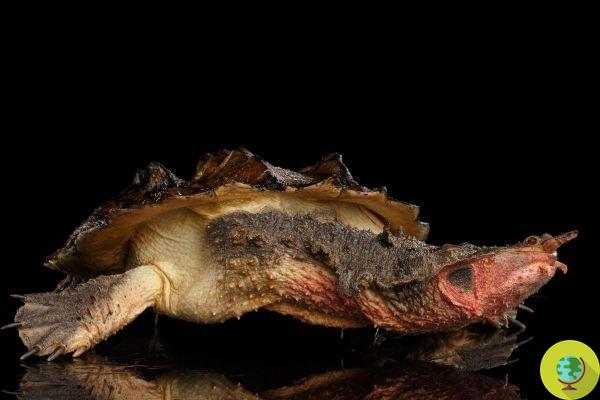
DNA tests saved thousands of specimens of the bizarre Matamata tortoise, a victim of the illegal trade in rare animals
He is about to end up run over, his mother saves himRapid new DNA test by Colombian officials stopped illegal shipping of more than 2.000 Matamata turtles
Le Matamata turtles they are a native species of South America and are characterized by a rough and gnarled exoskeleton. They represent a very popular product on the market due to their bizarre appearance, and every year thousands of specimens end up in the hands of traffickers to be then distributed in pet shops in the United States, Europe and Asia; their price is around 300 dollars. In Colombia, however, the trade in these animals is illegal, as they are considered to be at risk of extinction.
Due to its particular appearance, it is not difficult to recognize a specimen of Matamata turtle. The DNA test, however, was necessary to understand what type of Matamata turtle it was: in fact, if it was initially believed that the Matamata was a single species, a recent study revealed that in reality there are two different species of Matamata tortoise - very similar in appearance but with genetic differences. Both typical of South America, one lives near the Orinoco River, the other lives in the Amazon River.
Once the batch of turtles destined for the black market has been discovered, it is important to quickly identify which species it is, so that the animals can be returned to their right habitat: bring an Orinoco tortoise to the Amazon River (or vice versa. ) could have negative effects on the entire population of turtles living in the area, affecting the genetic balance of the entire species.
Diego Cardenosa, a researcher at Florida International University, collaborated with a team of Colombian scientists to devise a specific DNA test to be able to distinguish the two species. The test is quick, easy to use and highly accurate in identifying the species, and it allowed the species to be identified in just two hours (at a negligible cost of about a dollar per test).
When our test was used to identify the species and make sure the specimens were returned to the wild environment they belonged to was wonderful - he says. Cardeñosa. - What makes us feel even better is that we can now use these tools to help many other species that are victims of wildlife crime, such as illegal trade. Our goal is to spread this DNA test as much as possible and make it part of routine checks by authorities around the world: this technology can help fight the illegal trade in many endangered species, such as sharks, turtles and eels.
Fonte: Florida International University
We also recommend:
- Norway conducts cruel tests on minke whales (despite opposition from many scientists)
- The plastic waste on the beaches is giving birth to all female turtles, the alarm of the biologists


























